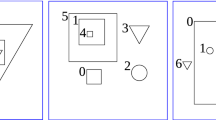Abstract
Inductive Logic Programming (ILP) is an efficient technique for relational data mining, but when ILP is applied in imperfect domains, the rules induced by ILP often struggle with the overfitting problem. This paper proposes a method to learn first-order Bayesian network (FOBN) which can handle imperfect data powerfully. Due to a high computation cost for directly learning FOBN, we adapt an ILP and a Bayesian network learner to construct FOBN. We propose a feature extraction algorithm to generate features from ILP rules, and use these features as the main structure of the FOBN. We also propose a propositionalisation algorithm for translating the original data into the single table format to learn the remaining parts of the FOBN structure and its conditional probability tables by a standard Bayesian network learner.
Preview
Unable to display preview. Download preview PDF.
Similar content being viewed by others
References
E. Alphonse and C. Rouveirol. Lazy Propositionalisation for Relational Learning, In Horn W., editor, Proc. of 14 th ECAI, Berlin, Allemagne, IOS Press, 2000.
M. Botta and A. Giordana and L. Saitta and M. Sebag. Relational learning: Hard Problems and Phase transition. Selected papers from AIIA’99, Springer-Verlag, 2000.
D. M. Chickering. Learning Bayesian Networks is NP-Complete. In D. Fisher and H. J. Lenz, editors, Learning from Data: Artificial Intelligence and Statistics V, 1996.
D. M. Chickering. WinMine Toolkit. Technical Report MSR-TR-2002-103, Microsoft, 2002
D. Fensel, M. Zickwolff, and M. Weise. Are substitutions the better examples? In L. De Raedt, editor, Proc. of the 5 th International Workshop on ILP, 1995.
L. Getoor, N. Friedman, D. Koller, and A. Pfeffer. Learning Probabilistic Relational Models. In S. Dzeroski and N. Lavrac, editors, Relational Data Mining, 2001
K. Kersting, L. De Raedt. Basic Principles of Learning Bayesian Logic Programs. Technical Report No. 174, Institute for Computer Science, University of Freiburg, Germany, June 2002
B. Kijsirikul, S. Sinthupinyo, and K. Chongkasemwongse. Approximate Match of Rules Using Backpropagation Neural Networks. Machine Learning Journal, Volume 44, September, 2001
S. Kramer, N. Lavrac and P. Flach. Propositionalization Approaches to Relational Data Mining, in: Dzeroski S., Lavrac N, editors, Relational Data Mining, 2001.
N. Lavrac and S. Dzeroski. Inductive Logic Programming: Techniques and Applications. Ellis Horwood, New York, 1994
S. Muggleton. Inverse entailment and Progol. New Generation Computing, Special issue on Inductive Logic Programming, 13(3–4):245–286, 1995.
Author information
Authors and Affiliations
Editor information
Editors and Affiliations
Rights and permissions
Copyright information
© 2003 Springer-Verlag Berlin Heidelberg
About this paper
Cite this paper
Chatpatanasiri, R., Kijsirikul, B. (2003). Upgrading ILP Rules to First-Order Bayesian Networks. In: Whang, KY., Jeon, J., Shim, K., Srivastava, J. (eds) Advances in Knowledge Discovery and Data Mining. PAKDD 2003. Lecture Notes in Computer Science(), vol 2637. Springer, Berlin, Heidelberg. https://doi.org/10.1007/3-540-36175-8_59
Download citation
DOI: https://doi.org/10.1007/3-540-36175-8_59
Published:
Publisher Name: Springer, Berlin, Heidelberg
Print ISBN: 978-3-540-04760-5
Online ISBN: 978-3-540-36175-6
eBook Packages: Springer Book Archive




